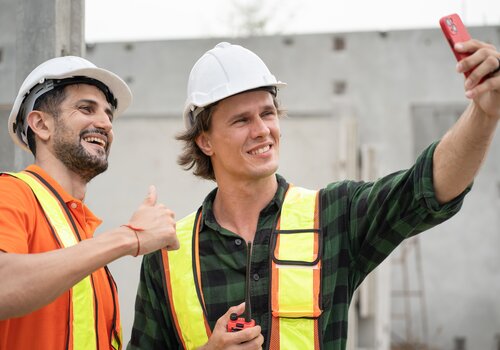If you are in a mental health crisis, call or text 988 to speak to a crisis counselor now. You can also text HOME to 741741 to reach the Crisis Text Line and speak to a live, trained crisis counselor. Learn more about the Suicide & Crisis Lifeline 988.
Discussing mental health has always been a bit taboo in the U.S. and especially so in the construction industry. Then, the COVID-19 pandemic happened.
Getting through the pandemic required the world to find silver linings. If we were avoiding people to keep our physical bodies well, that took a toll on our mental well-being. So, it seemed like much of the world was ready to talk about the mental effects of isolation and survival.
After the pandemic, it seemed like the construction industry was ready to start those conversations, too.
“I'm personally dedicated to consistently challenging the norms that cause the stigma,” says Josh Ierna, safety manager at Tilcon Connecticut. “COVID was the light switch, but it seemed like suddenly it was okay for everyone to talk about mental health and that’s what made things happen.”
CULTURAL BARRIERS TO MENTAL HEALTH
The construction industry has a deeply ingrained culture of stoicism. Workers are often reluctant to discuss their mental health due to fear of being perceived as weak or unfit for the job. This stigma is compounded by a lack of awareness and understanding about mental health issues, which prevents workers from seeking help.
The transient nature of construction work, with workers moving from site to site, can also lead to feelings of isolation and lack of a support network. The irregular hours and often remote locations of construction projects further exacerbate these issues, making it difficult for workers to access mental health services.
“Now we're at the same place with that next step. We're going to see the same statistics, regardless of the resources we talk about if we just keep running businesses the same exact way in the industry, especially at a time when the labor demand is at all-time highs,” Josh says. “It's not sustainable. Something's got to give here.”
Editor’s note: In a few weeks, we’ll hear more from Josh’s experience integrating the Total Worker Health program into Tilcon Connecticut’s safety plans. Stay tuned to CONEXPO CON/AGG 365 for that story.
You’ve got to want to do it for yourself, and you’ve got to want to talk to people about it and get better without any sort of conditions.
Denis Cashman
Co-Owner, Stone etc. Ltd.
STEPS TO BREAK THE STIGMA
- Awareness and Education: Raising awareness about mental health is the first step towards breaking the stigma. Companies should provide regular training sessions to educate employees about the signs and symptoms of mental health issues and the importance of seeking help. This can be achieved through workshops, seminars and the distribution of informational materials.
- Creating a Supportive Environment: Employers need to foster a supportive work environment where employees feel comfortable discussing their mental health. This can be achieved by promoting open communication and ensuring that workers know that their mental health is just as important as their physical health. Initiatives like mental health days and the presence of mental health champions on-site can make a significant difference.
- Accessible Mental Health Services: Construction companies should provide easy access to mental health services, such as counseling and therapy. Partnering with mental health organizations to offer confidential support services can encourage workers to seek help without fear of judgment.
- Implementing Policies: Developing and implementing mental health policies is crucial. These policies should include procedures for dealing with mental health crises, support for employees returning to work after mental health-related absences and regular check-ins to monitor employees' well-being.
- Promoting Work-Life Balance: Ensuring that workers have a healthy work-life balance can reduce stress and improve overall mental health. Employers should consider flexible working hours, adequate rest periods and promoting activities that encourage relaxation and social interaction.
DO IT FOR YOU
“You’ve got to want to do it for yourself, and you’ve got to want to talk to people about it and get better without any sort of conditions,” says Denis Cashman, co-owner of Stone etc. Ltd.
A lot of us get uncomfortable taking something for ourselves. The idea of selfishness comes to mind; and, in an industry like construction that is built on creating things for other people, taking care of ourselves can feel selfish. The big takeaway is it isn’t selfish. It’s necessary to heal and continue fighting the stigma.
“When I'm aware that today, just for today, I'm not going to drink, Denis says. “I can be a more useful, functional member of society. I get friends. I get employees who are happy with me. I get to go home to a wife who's happy to see me. I get to have all these things back in my life as a result of talking about things with people.
Content Notes: The CONEXPO-CON/AGG 365 newsletter will feature content about mental health over the course of the next few months. While these topics can be challenging, we want to remind you about one underlying feature: hope.
We will tackle topics related to suicide, PTSD and other mental health conditions that are prevalent in the construction industry. There are resources to help – whether you need help yourself or want to help a friend. Where there is help, there is hope.
One way to attack the mental health stigma is by telling your story. Please contact us if you would like to share your journey with fellow CONEXPO-CON/AGG 365 readers.
Another way to help is to share this story on your social media or with someone who may benefit from hearing about mental wellness in the construction industry.
Photo credit: MICHAELJUNG/BIGSTOCKPHOTO.COM












